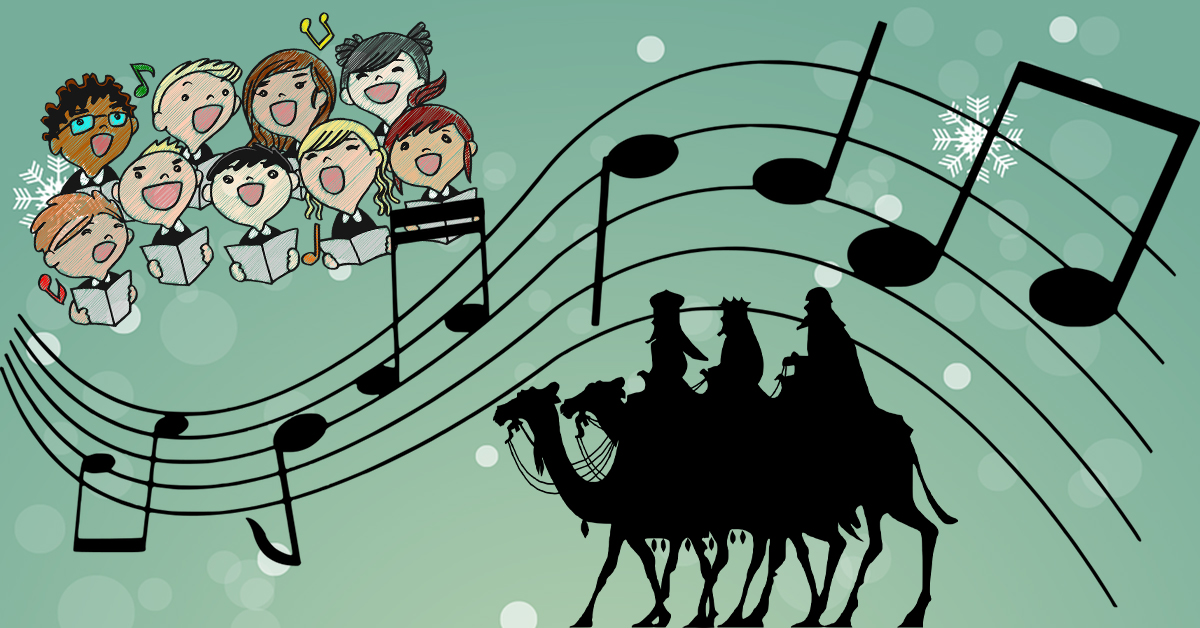Basque ethnography at a glance
In our culture, winter is a time of darkness, cold, only a few hours of daylight, the harvest is gathered in and there is not much work to do on the farms.
Young people, above all, would collect alms in the form of food. Some of these singing rounds, the Marijesiak or Abendua – as the Olentzero still is – were performed in large organised groups.
Yet there are two rounds where the children used to meet up and go wassailing at homes of their neighbours and close family members. We say used to meet up because it is a custom that has fallen out of fashion.
It used to be normal (as was also in my case) on New Year’s Day to sing for the uncles and aunts visiting during the family celebration and neighbours in return for some pocket money.
Specifically in my village, in Bedia, we came across these songs:
“Urte zaharra joan da, barrie etorri
ni enoa hemetik ezer emon barik”.
(The old year goes, the new one comes;
I’m not leaving / unless you give me something.)
“Urte barri barri
dekonak ez dekonari,
nik eztekot eta niri,
ezpabere txarri belarri.”
(New, new year / haves to have-nots /
I haven’t anything so to me / if not a sow’s ear.)
“Aingeruek gara
zeruti gatoz,
emon limosnea
por amor de Dios.”
(We are angels / we come from heaven /
give us a tip / for heaven’s sake.)
We found a similar version to the second one in Markina. The following one is from Berriz:
“Urtebarri barri,
daukonak ez daukanari,
zuk badaukazu emoiguzu,
ez badaukazu zuzenduizu.
Aginaldo Jaungoikoagaitik,
cantaremos dos,
en caso de aguinaldo
Jaungoikoagaitik.
Kantereten bat,
maileretan bi,
ekazu aginaldo
Jaungoikoagatik.”
(New, new year / haves to have-nots /
If you have, give us some / if you don’t take it. /
A bonus for God’s sake / we will sing two /
if there is a bonus / for God’s sake.
Singing one / two in the entrance /
Give us a bonus / for God’s sake.)
Epiphany was the second time alms were collected. The children would meet up again and go wassailing from house to house. The song we have included is quite similar in all the towns and villages, but as it is already so long forgotten, the references are lost in tune and it is not easy to recognise the text as a fragmented version has survived The elements vary from one version to another: Martin-the-trickster, the students, the cat/kite that stole the hens, the small cherry…
Mª Victoria Garai and Paben Uribiondo (Paben said that it was longer) provided this version in Bedia:
“Apalazio zaldune
hiru erregen egune.
Hiru erregek bialdu gaitu
limosnatxu bat biule.
Zotzak eta paluek
Martinikon kontuek.
Martinikori eroan dotsiez
hiru oilanda katuek.
Hareen hazurrak batu ezinik
harek dabilz saltuek.
Tiritaina Mari Montaña
Intxaurtxu bi eta lau gaztaina.”
(Knight Apalazio / it is Epiphany Day /
The Magi have sent us / for alms. /
Branches and sticks / the things of Martin-the-trickster. /
The cat has taken three hens / from Martin-the-trickster /
now he is leaping around / his bones are playing up. /
Mischevious Mari Mountain / two walnuts and four chestnuts.)
The custom has fallen into disuse, but as the song goes, singers were paid in walnuts and chestnuts, but would later be given money.
Some of the people interviewed said it was the girls that sang on New Year’s Day and the boys on Epiphany. Therefore, the girls sang “Urtebarri barri” to the boys on New Year’s Day and the boys “Erregen, erregen” to the girls on Epiphany.
We found the following version in Berriz:
“Erregen, erregen, Mari montaina
lau intxaur eta bost gaztaina.
Hiru Erregen eguna
zotzak eta paluak,
estudianteen kontuak
estudianteak sasi-sasi (sasi-eskola)
asko jan eta gutxi ikasi.
Keriza txiki beti
aurten da zure urtea
hemetik aurrera egingo’tsut
heldu eta jan eta bakea.”
(Magi, Magi, Mari mountain / four walnuts and five chestnuts. /
On Epiphany Day / branches and sticks /
Student things / students are always the same /
eat a lot and study a little. /
The cherry that is always small / this is your year /
From now on I will make you / arrive, eat and ready.)
“Erregen, Erregen Mari montaina,
zazpi intxaur eta zortzi gaztaina,
haren ganean lau sagar,
nik bai altzoa zabal-zabal.”
(Magi, Magi, Mari mountain / seven walnuts and eight chestnuts.
Four apples into the bargain, / really bounty on my lap.)
Igone Etxebarria
Labayru Fundazioa
See more on herriondarea.eus:
Busturia: http://herriondarea.eus/eu/ficha/urtebarri-eta-apalazio?map=1
Zamudio: http://herriondarea.eus/eu/ficha/apalazio-eguneko-kantua?map=1
Dima: http://herriondarea.eus/eu/ficha/erregen-eguneko-kantua?map=1
Basauri: http://herriondarea.eus/eu/ficha/urtebarriko-errezitadua-1?map=1
Bedia: http://herriondarea.eus/eu/ficha/urtebarri-1?map=1
http://herriondarea.eus/eu/ficha/urtebarri-eskea?map=1
Berriz: http://herriondarea.eus/eu/ficha/urtebarrikoak?map=1


